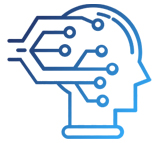- AI

Artificial Intelligence

Smart Products & Services
We follow Smart Products & Services

Intelligent Business Functions & Processes
We follow Intelligent Business Functions & Processes

Robotic Process Automation
We follow Robotic Process Automation

Personalized
healthcareWe follow Personalized healthcare

Identifying at-risk patients
We follow Identifying at-risk patients

Optimized routing and scheduling
We follow Optimized routing and scheduling
- ML

Machine Learning

Predictive
AnalyticsWe follow Predictive Analytics

Service Personalization
We follow Service Personalization

NLP
We follow NLP (Natural Language Processing)

Stock Market Forecasting
We follow Stock Market Forecasting

Fraud Prevention
We follow Fraud Prevention

Recommender engines
We follow Recommender engines
- blockchain

Blockchain

Public Blockchain
We follow Public Blockchain

Private Blockchain
We follow Private Blockchain

DEFI
We follow DEFI Blockchain

Initial stake pool offering development
We follow initial stake pool offering development
- IOT

Internet of Things
- AR
- Business Solutions

Business Solution

Business Performance Management
We follow Business Performance Management

Decision Making & Big Data Analytics
We follow Decision Making & Big Data Analytics

Enterprise Data Management
We follow Enterprise Data Management
- Apps

Apps

Native Apps
We follow Native Apps

Cross Platform Apps
We follow Cross Platform Apps

Web Apps
We follow Web Apps

Hybrid Apps
We follow Hybrid Apps

Cloud Native Apps
We follow Cloud Native Apps
- Lab

How Does Blockchain Resolve Enterprises’ Data Security and Privacy Matters?
Most phishing attempts are increasing, and no indications of this trend slowing down. Attackers continually discover new methods to breach systems, significantly increasing cyber threats and security breaches.
Because money and reputation are at stake, businesses are turning to technology, such as blockchain, for data privacy to make their processes hack-resistant. Using sophisticated ransomware techniques and DDoS attacks, today’s hackers are constantly attempting to acquire data such as intellectual property, medical records, personally identifiable information, and financial information. Due to the design of the technology, blockchain, and data privacy, firms are frequently hiring to address these problems.
So here in this blog, our blockchain consultants and experts will examine the advantages of utilizing blockchain technology for company data privacy. While you may have some knowledge of blockchain technology, it’s essential to comprehend that specific factors are crucial in ensuring optimal data privacy using blockchain.
Blockchain Components That Promote Data Privacy
The bases of blockchain rely on an unreliable, immutable architecture. Several ecosystem-integrated variables make this technology an excellent data privacy and security option.
Blocks and Hashing

Producers store data in blocks on the blockchain, comprising a header and a body, timestamped and signed. The blocks containing data are linked together in a chain. The chain includes the cryptographic hash that is of the previous block. It helps to maintain the immutability and protection of the blockchain data.
Distributed Architecture

Due to its distributed architecture and absence of a single point of failure, blockchain data privacy is a game-changing decision for enterprises. The network’s numerous nodes disperse the risk, making it difficult for attackers to target specific data since no central point is vulnerable to attack. This decentralized nature enhances the overall security and protection of sensitive information.
Verification via consensus

Any changes or modifications to the data stored in a blockchain require consensus from multiple authorized participants. These participants collectively validate and agree on the modification before it is implemented. This transparency and distributed verification make it extremely difficult for hackers to conduct hidden attacks on the system since any alteration to the blockchain is immediately broadcasted to all network users, ensuring data integrity and security.
Encryption
A substantial quantity of encryption safeguards the security and privacy of blockchains. The technology typically employs asymmetric-key algorithms and hash functions on each node. It ensures that data stored across the network is inaccessible to unauthorized users. Each encryption method has its subdivisions and branches.
Public Addresses
Every node in the blockchain possesses a private key and a public address, another element that promotes privacy and security. Therefore, when a node participates in a transaction, only the public address, a string of letters and numbers, is shared. People on the network can see the transaction and the letter-number combination but not the private key’s specifics.
These elements/features are the driving force behind blockchain privacy solutions. However, understanding how they translate into real-world use cases for data privacy on the blockchain is crucial for business owners. Let’s discuss this topic in the following section.
But before moving forward, you can secure your data with blockchain with our blockchain-based custom software development company! We have the best blockchain consultant, proficient in offering the USA’s most secure blockchain strategy and blockchain app development services. Protect your business with our decentralized solutions. Contact us now!
Privacy Implications of Blockchain
Blockchain supports data privacy through a combination of established use cases and ongoing developments. The current technology can address various business-level security issues, and there is potential for further improvements in the future.
Here are a few examples of how blockchain technology you can use for commercial purposes increases the efficacy of startups and corporations.
-
Secure Messaging
The vast majority of business messaging systems, such as Skype, Microsoft Teams, and Slack, have long been targets of hackers due to the commercial data and lax security algorithms they contain. These applications are set up on entirely open, censorship-resistant architectures, and all forms of communication, including calls, video conferences, messages, and file transfers, are encrypted end-to-end. They serve as a model of blockchain and data privacy success.
The Wispr application illustrates this, which employs encryption techniques such as AES-256 to make it difficult for unauthorized parties to view communications. Wispr’s security mechanism is VOBP (Voice Over Blockchain Protocol).
-
Protection of IoT
Integrating blockchain technology into connected devices is one of the most critical data security applications. Hackers primarily target centralized points of the IT infrastructure to gain unauthorized access and control over connected devices, including edge devices and AI-powered appliances.
These central points are more sensitive to cyber-attacks, causing it critical to enforce robust security measures to safeguard the entire network and ensure data privacy. Blockchain technology can improve security and privacy in the IoT ecosystem by delivering a decentralized and immutable record of transactions and device interactions.
You can utilize blockchain to implement data privacy by employing the Internet of Things (IoT) in a variety of methods, including:
Encrypted data transmission: Blockchain guarantees secure data exchange between IoT devices through encryption, defending sensitive data from unauthorized access.
Real-time tracking and duplicate content identification: Blockchain allows transparent and tamper-resistant tracking of IoT sensor data, guaranteeing correct and verified data while stopping duplication from risky sources.
Decentralization of authority: Executing blockchain in IoT removes central control, improving data privacy and lessening susceptibilities to cyber threats by distributing decision-making across the network.
-
Safe DNS and DDoS
DDoS attacks, or distributed denial of service, occur when hackers slow or close down a system, preventing users from accessing a website or server. On the other hand, DNS attacks occur due to the Domain Name System’s centralized structure, which allows attackers to compromise the connection between a website’s IP address and domain name. This renders a platform inaccessible and may lead users to fraudulent websites.
By decentralizing all DNS entries, blockchain privacy protection can thwart such attacks by eliminating vulnerable points that attackers can exploit.
-
Storing Of Immutable Data
Businesses, including startups, must address one of the most critical issues – business data fraud. Experts predict a $5 million loss from data intrusion in 2023, with improper data storage being a significant contributing factor. While the data protection blockchain mechanism advocates decentralized data storage, most businesses still store records on centralized platforms, which could compromise their security.
Businesses can store data on the decentralized network within a transparent system employing blockchain data privacy techniques, where only those with access can view or use the data.
-
Determining The Origin Of The Software
Going for trustworthy sources is essential for software updates and excellent hygiene practices. Occasionally, users install updates from malicious sources without fully comprehending the consequences. Using a hashing technique that enables businesses to verify downloads, updates, and patches with software developers, blockchain support for data privacy helps on this front.
You can also use the blockchain to monitor and store information regarding software updates. This allows the team to identify any members who may be downloading malicious software with the intent of causing damage to the organization.
-
Ownership validation
In the increasingly crowded digital space, where imitations and replicas flourish, it is increasingly difficult to establish ownership, making it difficult for businesses to determine whether their partners are authentic or not. With the immutable record of authenticity, the DLT -Distributed Ledger Technology system’s capability to perform KYC (Know Your Customer), and possessing cryptographic keys, you can all use them as blockchain data privacy solutions for this issue.
The benefits associated with identity and access management extend this blockchain data privacy application for enterprises.
- Data Reduction
- Prevention of Identity Theft
- Multi-signature Access Control
- Security of Sensitive Data
These six use cases represent only a tiny portion of the possibilities for enhancing privacy and security with blockchain. Businesses are actively exploring a diverse range of technology-driven security measures to further strengthen their data protection efforts. The potential applications of blockchain in this area are extensive and continue to expand as companies seek innovative solutions for safeguarding sensitive information.
How Sky Potential US Blockchain Technology Can Safeguard Your Data?
When a company contacts Sky Potential US inquiring about our blockchain app development services, our first thought is to design a scalable solution with minimal disruption.
Then, our blockchain consultants and specialists take the time to comprehend your business’s needs and existing and potential weak spots to determine how blockchain can enhance your company’s business security.
Throughout the development process, we account for the possibility of blockchain hijacking. Hackers have discovered various entry points to blockchain systems, including privacy concerns with a public blockchain, phishing attacks that target private keys, poor governance, and vulnerabilities in smart contracts.
For the blockchain privacy protection solution to function as intended, we construct a blockchain strategy that prioritizes security and blocks the numerous entry points through which hackers can compromise the system. As a result? Our focus on security during the development process helps ensure that the dApps (Decentralized applications) built on the blockchain remain secure and free from any successful hacking attempts.
Do you want a similar result for your business? Ask us how to incorporate blockchain-based data protection into your process or endeavor.
Conclusion
Blockchain technology offers robust data privacy and security solutions for enterprises. Its decentralized and immutable architecture and features like encryption and verification via consensus safeguards sensitive information. Real-world applications include secure messaging, IoT protection, safe DNS, immutable data storage, software origin verification, and evidence of proprietorship.
As a leading blockchain-based custom software development company, our blockchain consultant provides expert blockchain consulting and app development services. Our blockchain expertise ensures that businesses can protect their data and operations from hacking attempts.

















































Leave a Reply